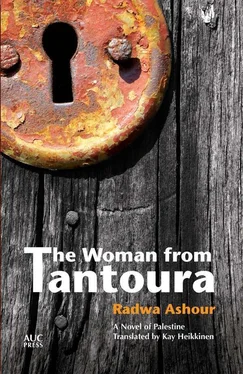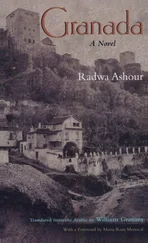Maryam is talking about the trip, she’s burning to join Abed in France. She’s arranged all the details with him: she’ll be an intern during the first year and then start her specialty training. I do not comment. She thinks I’m worried because I want her to get married; she’s twenty-two, when will she marry? Abed is thirty-five; will she be like him? I put my concern into words, but I do not speak about the other topic, not about where to go from here. Abu Dhabi? I don’t want that. Maryam says, ‘Come with me.’ Abed also says to come, that he wants me to live with him, but I won’t go. There’s a lump in my throat, just a lump that doesn’t go away, maybe because I don’t talk about it with anyone. Sadiq is no longer satisfied with calling once a week, instead he calls twice and sometimes three times. He gathers what’s bothering me, and assures me that they’re waiting impatiently for me. I say, “God willing”; the expression worries him, or maybe my way of saying it, and he insists more: “You won’t stay in Alexandria one day after Maryam leaves. What’s tying you to Alexandria?” I don’t say, a house, even though it’s temporary. I hang up and explode at Maryam, as if she were Sadiq or represented him: “Children are strange, they think their mother is a suitcase they can take with them wherever they go. They pick it up here and put it down there. My God!” I was angry. Maryam kissed me and said, “The boys, not the girls. I for example would like to be a suitcase. You would carry me and take me with you wherever you went. Imagine what would happen if you left me! A poor, abandoned suitcase, belonging to no one, crying bitterly. Then a kind passerby would notice and say, ‘What’s wrong, Suitcase?’ She would say, ‘My mother left me,’ and the kind man would take me around the streets looking for my mother.” She wants to make me laugh, but I don’t laugh. I exclaimed, in a voice that seemed to me louder than it should be, “Damn exile, and damn Palestine!” The air was tense; Maryam disappeared. She came back carrying a tray with two cups of coffee; she put it on the balcony and said, “Come on, let’s have coffee. You’ll look at the sea and drink coffee with the apple of your eye, by which I mean Dr. Maryam, in person.” I laughed, not because of her words but because as she was dragging me to the balcony by one hand, she was using the other to tickle me on the side, on my shoulder, and under the arm.
“Sadiq, I’m going back to Sidon.”
“On a visit?”
“No, I’ll rent an apartment and live there. In the summer we’ll all get together there.”
“God bless you, Mother, can’t you find anywhere but south Lebanon, with the Israelis as your neighbors?”
“They’ll leave.”
“General Giap has spoken. He said they would leave, and they left!”
“Who’s General Giap?”
“A leader of the Vietnamese liberation forces in the fifties and sixties. Now General Ruqayya has decided.”
I did not lose my temper over his sarcasm. I repeated coldly, “They’ll leave!”
“Even if they left, every time there’s friction or at every little crisis they’ll shell the south and storm in. Anyway Hasan and Abed won’t be able to visit you in Lebanon.”
“There’s no problem for Abed, he has a French passport.”
“And Hasan?”
I did not answer.
“Mother …” He marshaled his arguments and the call lasted half an hour before I hung up. In the evening I asked Maryam, “How much time will you stay in Alexandria after the exam?”
She said, “I’ll wait for the results, and then to get my certificates from the university and have them notarized, then I’ll leave. Maybe I’ll need a couple of months. Why do you ask?”
“I don’t want to start getting ready for the trip while you’re studying for the exams. As soon as you finish your exams I’ll begin to pack up the household.”
“You’ve decided?”
“I’ve decided.”
“Sidon?”
“Yes.”
“Did Sadiq agree?”
“He didn’t agree, but I’ve decided.”
From Alexandria I followed the liberation of the south. Maryam was in her bachelor’s exams, either in the college taking an exam or in her room studying. I would almost call her to see what I saw, and then stifle the call. But I did not stifle the tears. Maybe if she had been sitting beside me I would have stifled them out of embarrassment. It’s strange; where did all these tears come from? Why are tears linked to sadness and care? Were they tears of joy, then? No, neither sadness nor joy, but something larger, with greater depth, ambiguous, like the look in your eyes when someone holds the newborn that has just slipped out of you. The newborn is wet with your water and blood, and whoever holds him, doctor or midwife or your mother, holds him upside down, by his feet. He’s warm, about to open his eyes, about to announce with a cry that he has opened the airway in his throat to live. You’re weary, maybe suspended between life and death; you look up weakly and tears flow from your eyes, not in sadness or in joy but rather … rather what? It’s beyond my ability to put into words. Maybe it’s a spring in some obscure place inside the body or the spirit or the earth, like the spring in the southern cave, east of town. My mother says that its water is sweet, like the water of Kawthar. “What’s Kawthar, Mother?” She says it’s a river in Paradise. I find that strange — how does she know the taste of a river in Paradise, had she ever visited it? Later I heard someone say that “Paradise lies at the feet of our mothers.” I was seven and I thought, “then she did visit it; why didn’t she tell me?” Television broadcasts scenes of the liberation live, and the mothers on television, who look like my mother and my aunt, trill and rejoice. They throw rice and rose petals on those who are returning to their villages. I’ll live there, I’ll live beside the tomb of my mother and my uncle Abu Amin, and when the time comes I’ll settle beside them. One day maybe they’ll take us all there. To the parking lot? Fatima said that they are under the ‘parking,’ there; that’s the expression she used. But why move us? Maybe it would be better for us to stay where we are, like guards at the gate, between our old camp and the country that has become ours once again.
I’ll cut out everything I’ve just written; if Hasan read it he would say that there’s no call for that kind of talk, it’s emotional and exaggerated and spoils the writing. People followed the liberation of 2000 on their television screens and it was described in thousands of reports and newspapers, and written about by specialists and non-specialists alike. I want you to write about what you witnessed. Isn’t this a part of the testimony, Hasan? My fast heartbeat, the box of tissues, blowing my nose again and again as I watch the residents return to their villages twenty years later? God keep you, Sadiq, what’s left of life is less than what’s passed; let me do what I want.
Yes, I will live in the seventh and last house. I suddenly sit up in bed, after lying there between sleep and waking. I count on my fingers: our house in Tantoura; my uncle Abu Amin’s old house in Sidon; the marital home, in Sidon also; the house on the Tariq al-Jadida in Beirut; then Abu Dhabi, then Alexandria. The seventh will be there in Sidon, at the gate. I like the number seven, maybe it’s a blessing. I feel the key hung on my neck and Abed’s gift, the silver piece made by the Kurd, carrying on the trade of his teacher, the Sabian smith.
I got up and began to pack a suitcase for travel. Maryam knocked on the door, saying “I thought you were asleep.”
“Are you still studying?”
Читать дальше












